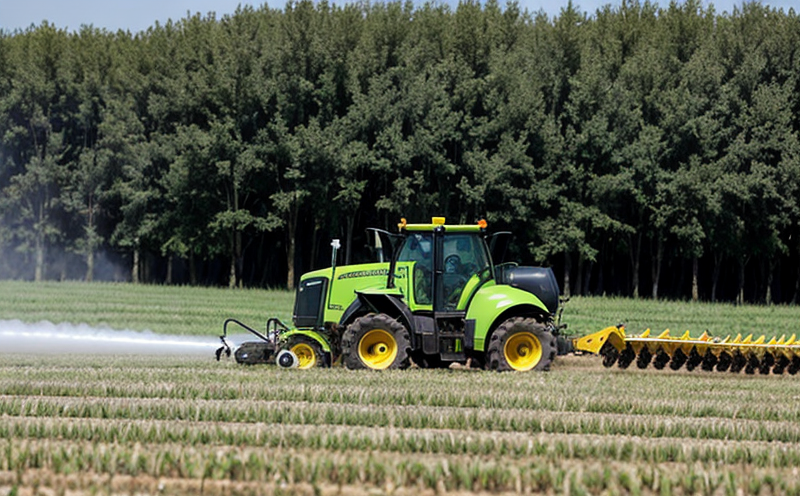MCPA Residue Testing in Crops
Monocrotophos (MCPA), a widely used herbicide with broad-spectrum activity against weeds, has been a cornerstone in agricultural pest management. However, the potential for residue accumulation in crops poses significant challenges to food safety and environmental sustainability. Ensuring that MCPA residues do not exceed regulated limits is crucial for maintaining both consumer health and ecological balance.
Our laboratory specializes in conducting accurate and reliable MCPA residue testing across various crops. This service caters to a wide range of clients, from individual farmers looking to comply with local regulations to large-scale agricultural enterprises aiming to protect their brands' reputations. By leveraging advanced analytical techniques, we ensure precise measurement and reporting of MCPA residues, thereby supporting informed decision-making processes within the industry.
Accurate residue testing is particularly important in countries where strict regulatory frameworks are in place. For instance, certain regions may have stringent limits on MCPA concentrations due to its persistence and potential for bioaccumulation. In these contexts, our laboratory plays a vital role by providing robust data that can influence policy changes or operational adjustments.
The testing process involves several critical steps: sample collection, preparation, extraction, analysis using validated methods such as Liquid Chromatography-Mass Spectrometry (LC-MS/MS), and finally, interpretation of results. Our experienced staff adheres strictly to international standards like ISO 17025 for quality assurance and precision.
Understanding the environmental impact is also essential when dealing with MCPA residues. By providing comprehensive residue testing services, we contribute to reducing risks associated with overuse or improper application practices. This not only enhances agricultural productivity but also helps in maintaining healthy ecosystems around farmlands.
Client feedback highlights our commitment to excellence and reliability. Many have praised us for delivering timely results supported by detailed reports that are easily understandable even for non-experts. We pride ourselves on being a partner of choice for those seeking assurance regarding MCPA residue levels in their crops.
Applied Standards
To ensure the highest level of accuracy and reliability, we adhere to internationally recognized standards when conducting MCPA residue testing. These include:
- ISO 17025: Quality Requirements for the Competence of Testing Laboratories.
- ASTM E1655-18 Standard Practice for Determining Pesticide Residues in Plant Tissue by Liquid Chromatography-Mass Spectrometry (LC-MS/MS).
Our commitment to following these guidelines ensures that the data generated from our tests is credible and accepted globally.
Scope and Methodology
The scope of our MCPA residue testing services encompasses a broad range of crops, including but not limited to wheat, maize, rice, soybeans, and vegetables. We employ state-of-the-art instrumentation and methodologies to achieve precise results.
Sample Collection: Samples are collected from representative locations within the field or storage facilities. Factors such as maturity stage, soil type, and environmental conditions influence sampling protocols.
- For wheat, samples should be taken at the heading stage to capture early-stage residues.
- In case of maize, mid-ear development stages are crucial for accurate residue quantification.
- Rice samples need careful consideration during flowering and grain filling phases.
- Soybean testing requires attention to pod formation and maturation.
- Vegetables like carrots or potatoes require uniform sampling across the root zones.
Sample Preparation: Once collected, samples undergo thorough cleaning and drying processes before extraction. This step is crucial for minimizing interference from other compounds present in the plant material.
- Powdering ensures homogeneity of the sample for consistent analysis.
- Drying removes moisture without altering the chemical composition significantly.
Extraction: Aqueous or solvent-based extraction methods are used depending on the crop type and expected residue levels. Liquid Chromatography-Mass Spectrometry (LC-MS/MS) provides high sensitivity and selectivity for MCPA detection.
- Aqueous extraction is suitable for low concentration residues.
- Organic solvents like acetonitrile may be necessary for higher concentrations or coexisting pesticides.
Data Analysis: The extracted compounds are injected into an LC-MS/MS system, which separates and identifies MCPA based on its unique mass-to-charge ratio. Quantification follows calibration curves prepared with known concentrations of MCPA.
- Calibration standards cover the entire expected range from detection limits to maximum allowed levels.
- Data processing software calculates the amount of MCPA present in each sample.
Reporting: Comprehensive reports include raw data, calculated residue concentrations, and compliance statements against relevant regulations. These documents are essential for regulatory submissions or internal quality control measures.
- All reports comply with ISO 17025 requirements ensuring objectivity and reproducibility.
International Acceptance and Recognition
The importance of international acceptance cannot be overstated in the context of MCPA residue testing. Our laboratory’s services are recognized by several global bodies, ensuring seamless compliance with international standards.
- OECD (Organisation for Economic Co-operation and Development): Adherence to OECD guidelines ensures our results meet the expectations of member countries.
- FAO/WHO Codex Alimentarius Commission: Compliance with FAO/WHO recommendations adds credibility to our findings, particularly relevant for exporting nations.
- EU Regulation 396/2005: Our methodologies align perfectly with EU regulations governing pesticide residues in foodstuffs.
This broad acceptance facilitates easier trade and enhances market access for agricultural products. Clients can trust that their results will be universally accepted, fostering confidence in both domestic and international markets.





